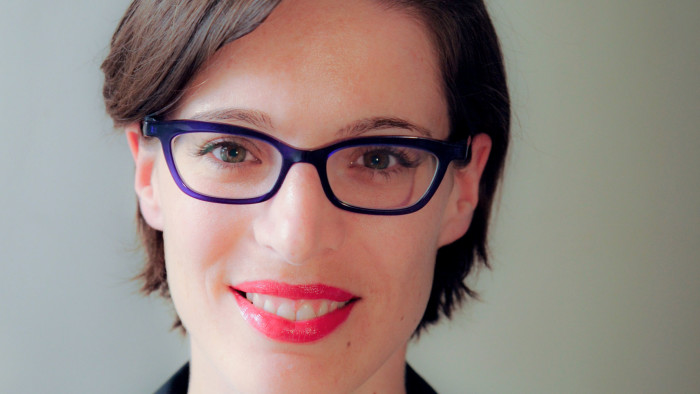Charlotte Findeling

Roula Khalaf, Editor of the FT, selects her favourite stories in this weekly newsletter.
Charlotte Findeling is a masters in management graduate from Edhec Business School in France and managing partner of Deuz, a company that creates clothing and toys for children, which she founded with two other women, one of whom is her sister.
Ms Findeling grew up in Paris and studied at Edhec and the Universidad Iberoamericana before joining LVMH London as a business analyst for the perfumes and cosmetics branch. She has also worked as a finance controller for Christian Dior and a financial auditor for PriceWaterhouseCoopers. But after six years working in the finance and audit industry, she wanted to apply her managerial skills to something more creative.
In her spare time, Ms Findeling enjoys visiting exhibitions, concerts and reading. In 2012, she took part in the G20 Young Entrepreneur Summit in Mexico, an annual international summit that calls upon the G20 leaders to focus on entrepreneurship as an answer to the issues around youth employment and slow economic growth.
1. Who are your business heroes?
Vandana Shiva, the Indian philosopher and environmental activist. She fights for change in the practice and paradigms of agriculture and food. I admire her courage and energy to move things on a global scale.
2. What is the best piece of advice given to you by a teacher?
When facing an obstacle, the stubborn will keep on trying the same way and get stuck, while the fighters will eventually find another way to reach their target. I often think about this idea shared by a teacher in Mexico.
3. What would you do if you were dean of a business school for the day?
Even though business schools have improved the interaction between enterprises and students, I still believe that in France we have a deficit of entrepreneurs. As a dean, I would invite young entrepreneurs to interact with my students, reassure them and show them what it is all about.
4. What is the worst job you have ever had?
I learnt and progressed from all my experiences, from my first internship as a coach in a daycare centre in Toronto, to my last position at the head office of Christian Dior Couture …Each time I felt I wasn’t being challenged enough, I changed jobs and eventually created my own.
5. What advice would you give to women in business education?
I would tell them to be ambitious, to take the time to define objectives that are in line with their motivation and give themselves the means to achieve these, no matter what people think and say.
I would tell French women in particular to accept the possibility of failure. In France there is no right to fail, especially for women. We need to overcome this and make the most of our lives!
6. How do you deal with male-dominated environments?
I have worked in Mexico and India, two countries dominated by men. I believe that any woman can make it but we have to be fully ready and anticipate all questions and issues. I learnt patience, I understood the importance of listening and getting straight to the point. In the end, when a negotiation goes well or an agreement is signed, my male partners look even more enthusiastic about dealing with a strong woman.
7. What is the last book you read?
The White Tiger by Aravind Adiga, which gave me an insight into Indian culture in a very humorous way.
8. What is your favourite business book?
I believe business is all about creativity. My business books are inspiring books that give original approaches to daily life. On the current crisis, I read Pour éviter le Krach ultime [To avoid the ultimate crash] by French economist Pierre Larrouturou.
9. What inspires you?
I am inspired by my father, who’s always lived without boundaries, without fear and with a lot of humour. I am also inspired by the artisans I now meet. My inspiration also comes from all the sights I see in Paris, Montpellier, Delhi and other places.
10. If you could do it all again, what would you do differently?
I would certainly spend more time on non-academic courses, like music or the arts. I did not measure the importance of creativity when I was 20.
Comments